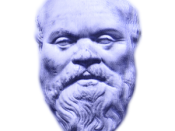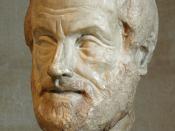Aristotle as a philosopher on a variety of subjects approached his work with a unique scientific teleological argument, asserting that everything in nature has a specific function and a purpose to fulfil it. Intrinsical to his argument is his claim that "man is a political animal", meaning that only within a civic community, or Polis can he successfully fulfil his purpose in life, to achieve Eudaimonia. Literally translated, this is taken to mean happiness, which in English is interpreted to suggest a personal human emotional state. However, the Greek translation carries connotations of public success and fulfilment, rather than a personal feeling of contentment.
Greek city-states consisted of several associations which together formed a state with a political constitution. The very foundation of this is the household, many households merge together to form villages which in turn create city-states. The highest of these associations is the Polis and, according to Aristotle, its primary function is to achieve Eudaimonia for all its inhabitants.
Aristotle asserts that a state cannot be happy unless it prospers. Yet, in order to prosper, he claims that the state must exercise 'good actions'. To be able to employ these 'good actions' virtue is what is needed within the state.
Since the household is the foundation upon which the Polis is formed, virtue is needed within this association in order for the Polis to prosper. Aristotle alleges that justice encompasses all human virtues:
"Justice means either lawfulness of fairness. Laws encourage people to behave virtuously, so the just person, who by definition is lawful, will necessarily be virtuous." Aristotle (92:107)
Aristotle believed the just distribution of wealth among members of a community should be proportional to their merit. This is a virtuous mean between the vices of giving more than a person deserves and giving...



Only one thing to add...
I know I'm always going on about this, but it really is so important to include your sources at the end of your essays guys!
3 out of 3 people found this comment useful.